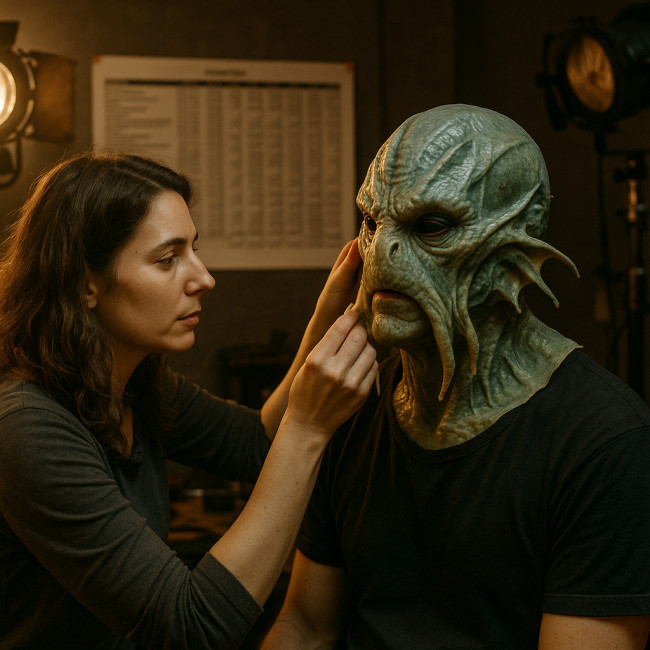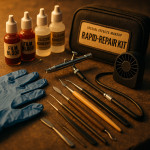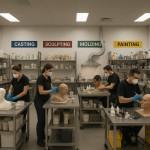Prosthetic budgets: costing a SFX maquilleur for low-to-mid-range films
Struggling to cost a SFX maquilleur and prosthetic package that fits the tight margins of a low-to-mid-range feature? This guide demystifies line items, reveals realistic price brackets and shares negotiation levers so your creatures, wounds or age make-ups look studio-grade without blowing the schedule.
Why a detailed budget is non-negotiable
When a script calls for prosthetics, producers often underestimate the compound costs: sculpting time, lifecasts, specialised materials, on-set resets, rapid repairs and post-shoot disposal. A precise budget safeguards:
- Continuity—matching edges and paint jobs across multiple shoot days.
- Safety—medical-grade adhesives, hypoallergenic silicones and sterile storage.
- Morale—no late-night panic when a wound appliance fails because cheaper glue was used.
Studios browsing the special effects makeup artist directory now expect a clear cost sheet before considering bids.
Key cost drivers for a SFX maquilleur
1. Creative complexity
The deeper the transformation—full creature suits, mechanical components, translucent burns—the steeper the sculpting hours and mould stages.
2. Material choice
Silicone gels offer unmatched realism but cost 20–40 % more than foam latex. Weigh looks against longevity with this deep-dive on silicone versus foam latex.
3. Shoot length and reset frequency
Night shoots and water scenes shorten appliance life. Extra duplicates and alcohol-activated palettes must enter the quote early.
4. Prep-lab overhead
Rental of pressure pots, vacuum chambers, 3D printers and climate-controlled drying racks can equal 10–15 % of the maquilleur's labour fee.
5. Rapid-fire pickups
Fast turnaround days after principal photography call for cold-stored duplicates and standby technicians.
Typical prosthetic makeup budget: low vs. mid-range film
| Line item | Low-budget film (≈ US $250k) | Mid-range film (≈ US $5 m) |
|---|---|---|
| Maquilleur labour (prep + set) | US $6 000–9 000 | US $18 000–30 000 |
| Lab assistant(s) | US $2 000–3 500 | US $8 000–12 000 |
| Materials (silicone/latex, paints, fibres) | US $4 500–7 000 | US $15 000–22 000 |
| Equipment rental | US $1 200–2 000 | US $5 000–8 000 |
| On-set consumables & PPE | US $800–1 200 | US $2 500–4 000 |
| Contingency (5–10 %) | US $800–1 500 | US $3 000–7 000 |
| Total estimate | US $15 300–24 200 | US $51 500–83 000 |
Source : Production Beast
Stretching the budget—without cheapening the look
Bundle prep and shooting days
Lock the maquilleur's calendar early and group all heavy make-up scenes. Reduced travel and call times can shave 15 % off labour.
Batch-cast appliances
Pour duplicate pieces while silicone and foam kits are already mixed. This cuts waste and lowers per-unit cost by up to 30 %.
Opt for hybrid solutions
Combine practical prosthetics with VFX touch-ups. Align both teams early—see look-dev sync guidelines (article available soon)—to avoid overlap charges.
Go green, save green
Recycled encapsulators and plant-based cleansers reduce disposal fees. More tips in our eco-friendly prosthetics roadmap.
Payment milestones and paperwork
Transparent cashflow keeps sculpts on time and silicone fresh:
- 30 % deposit—secures lifecasting and initial sculpts.
- 40 % mid-lab payment—covers moulding, casting and paint checks.
- 30 % on wrap—released after final touch-ups and appliance returns.
Speed up processing with these ready-to-use invoice templates.
Hidden costs producers forget
- Script rewrites—new gags need fresh moulds; factor an extra 8–10 %.
- Weather damage—desert heat degrades edges. Portable coolers add US $300–500.
- Chemical disposal—solvents must follow local regulation; budget at least US $150 per barrel.
A detailed breakdown means faster approvals when you submit the schedule—see script breakdown timing tips.
Case study: a creature build on a US $5 m indie
Director Ayana Cole wanted a full-torso sea monster for three night shoots. The team hired one senior SFX maquilleur and two juniors. Key takeaways:
- Digital concept sculpt sped up approvals by five days.
- Silicone skins tinted in the mould saved paint hours.
- Batch-poured backup gills avoided overnight remoulding when one tore.
- Total spend: US $52 800, within 1 % of the pre-shoot quote.
CTA: lock your SFX maquilleur early

Ready to negotiate a watertight prosthetic budget? Use the checklist above and start lining up interviews before pre-production crunch time hits. Early engagement secures your first-choice artist, locks material prices before commodity spikes, and leaves room for R&D iterations that can make or break a creature's believability. By structuring payments around clear milestones, maintaining a 5–10 % contingency buffer and documenting every edge blend or paint recipe, even a micro-budget can fund prosthetics that hold up to 4K scrutiny and keep financiers confident their capital is on screen—where it counts.
FAQ
- How much does a SFX maquilleur cost per day?
- Between US $450 and US $1 200 depending on union status, complexity and kit inclusion.
- Is silicone always better than foam latex?
- Silicone offers translucency but is heavier and pricier. Foam latex breathes and costs less—ideal for long wear or tight budgets.
- How early should I book the maquilleur?
- Six to eight weeks before shooting if lifecasts are needed. Rush bookings add 20 % or more.
- Can one maquilleur handle multiple actors?
- Yes for minor wounds. For full-head appliances on two or more actors, budget at least one assistant.
- What happens if a piece fails on set?
- Contingency kits and rapid repair adhesives are charged in the consumables line. Always keep 5–10 % of the budget free.








